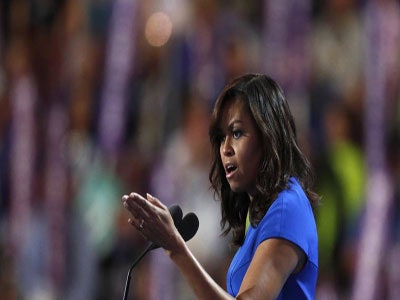Invoking the new silver screen legacy of three Black women who worked behind the scenes to help NASA send the first American into space, First Lady Michelle Obama said Thursday that the nation won’t advance unless diverse voices are at the table.
“Each of these women decided to believe in herself and stepped up when her country needed her,” Obama told an audience who got a private White House screening of “Hidden Figures.”
The forthcoming movie is described as the “incredible untold story of Katherine G. Johnson, Dorothy Vaughan and Mary Jackson,” who “served as the brains behind one of the greatest operations in history: the launch of astronaut John Glenn into orbit.”
 First Lady Michelle Obama says “you don’t come up with the right answer if everyone at the table looks the same, thinks the same and has the same experience.”
First Lady Michelle Obama says “you don’t come up with the right answer if everyone at the table looks the same, thinks the same and has the same experience.”Obama said the story portrayed in the movie is a prime example of how great things can be accomplished when America taps the talent and energy of all of its people.
“As we get access to these seats of power and these tables of power, I want you to look around and make sure there is diversity at the table,” Obama said. “Because you don’t come up with the right answer if everyone at the table looks the same, thinks the same and has the same experience. You never come up with the best answer.
“So when you get these seats at these tables of power, your obligation is to make sure that the conversation is diverse, because what we saw in this film is that when we pulled together men and women, people of every background and color and faith, immigrants who came here to make America their home, when we bring all of that brainpower to the table, anything is possible, even going to the moon.
“That is how America won the space race in the 1960s,” Obama continued. “And that approach is just as important today. Because make no mistake about it: That’s how we’re going to fight all the challenges that we face on this planet.”
Obama’s remarks come at the tail-end of her family’s groundbreaking eight-year stay at the White House and at a time when worries proliferate — whether rightly or wrongly — that diversity will take a back seat in the heavily military and business leader-laden administration of her husband’s successor, President-elect Donald J. Trump.
And, quite notably, “Hidden Figures” is set to hit American theaters just weeks after the passing of the late John Glenn, the astronaut whose celebrated mission as the first American in space is at the heart of the film.
Thursday’s event at the White House featured the cast from “Hidden Figures.” Speaking to young girls and women who are studying STEM, the actresses who portrayed Johnson, Vaughan and Jackson all shared what they got out of playing the roles of the Black heroine mathematicians.
Taraji P. Henson, who played Johnson, said Johnson’s legacy as a Black woman in a field dominated by White males speaks to her fearlessness, tenacity and brilliance.
Octavia Spencer, who played Vaughan, said: “The hallmark of a great leader is to be a good team member and to understand how to assess the talent that each team member contributes.”
Janelle Monae, who played Jackson, praised Jackson for fighting not just for herself, but to help advance the STEM careers of other women and minorities at NASA.
Mimi Valdes, who served as producer of the movie along with singer Pharrell Williams, said one aim of the movie is to inspire more interest in STEM careers. She noted that Williams has a Virginia-based foundation — “From One Hand to Another” — that seeks to do the same thing through a summer camp.
“If there’s a way that we can make math look cool and STEM careers look cool, how awesome would that be?” Valdes said. “This is really the first movie that has showed this level of female brilliance on the screen. And the fact that these were Black women? It’s just been a project that has so much fairy dust on it and we’re proud.”
Margot Lee Shetterly, author of the book on which the movie is based — “Hidden Figures: The American Dream and the Untold Story of the Black Women Mathematicians Who Helped Win the Space Race” — said the story is “American history.”
Shetterly said the story of Johnson, Vaughan and Jackson — whom she said she knew through her NASA scientist father — was “literally” in her own backyard growing up in Hampton, Virginia, but that only recently did she begin to appreciate what the story represented.
“This is all of our history,” Shetterly said. “These women and their legacies, we see it in John Glenn’s successful flight, we see it in the computers that we have and take for granted today. I think it’s time we recognize what they have given to all of us in our country.”
Jamaal Abdul-Alim can be reached at [email protected]. Follow him on Twitter @dcwriter360.















